You understand how annoying it may be if a trailer hitch ball rusts onto the coupler of your trailer.
It’s challenging to get the ball out, and doing so might harm the coupler on your trailer.
We’ll explain in this blog article how to remove a rusted hitch ball without harming your trailer.
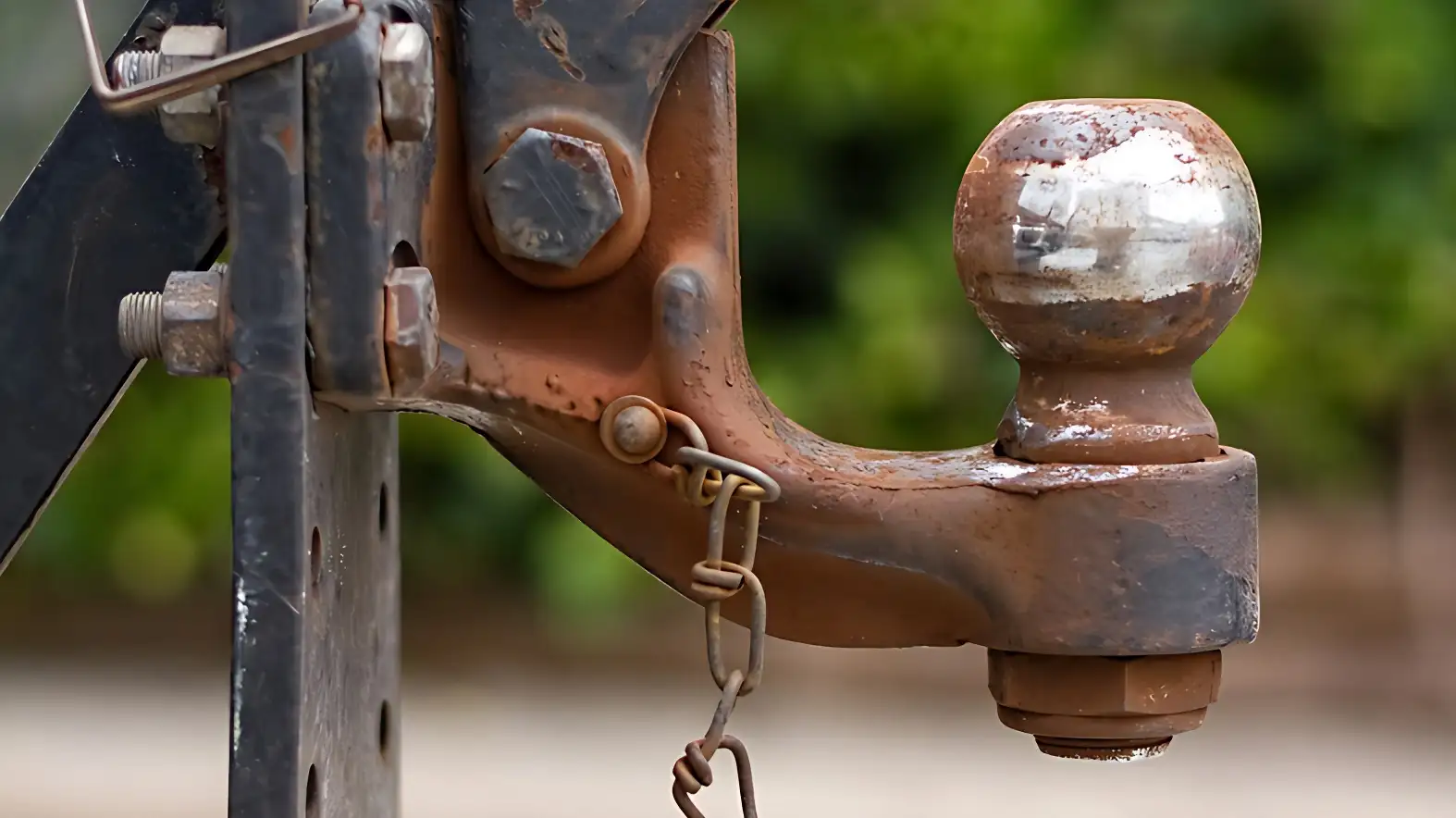
How to remove a rusted trailer hitch ball-(Step-by-step instructions)?
Tools and materials you’ll need:
- Rust penetrant (like WD-40)
- A hammer
- A chisel
- A drill
- A rust removal tool (like a wire brush or sandpaper)
- A new trailer hitch ball
Coat the rusty hitch ball with a rust penetrant:
The corroded hitch ball needs to be treated in the beginning by being liberally sprayed with rust penetrant.
To help the rust come off, make sure to coat the full surface of the ball.
Prior to performing the next action, it is recommended to let the penetrant sit for a few minutes.
To remove the rust, use a hammer and chisel:
Once the rust penetrant has finished its job, you can begin removing the rust by chipping away at it.
To remove the rust off the hitch ball’s edges, use a hammer and chisel.
You might need to use a little force, but take care not to harm the coupler on your trailer.
Puncture the hitch ball through the middle:
You might need to drill through the center of the hitch ball in order to remove it if the other steps weren’t successful.
Just be sure you use a drill bit whose diameter is less than that of the hitch ball.
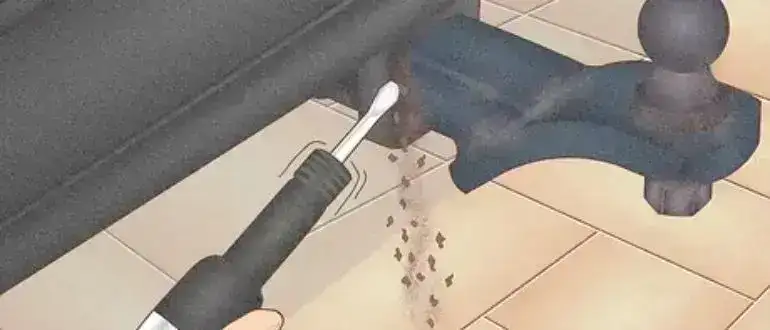
use a rust removal tool:
You may have some rust left over after removing the hitch ball.
The rust on your trailer coupler can be removed with a wire brush or sandpaper. You can also make use of a rust cleaning product if necessary.
Use the replacement hitch ball:
You can now attach the new hitch ball after removing the old one and cleaning the coupler.
Place the screw and tighten it until it is snug.
How To Remove Rusted Trailer Hitch Ball (Alternative Method)?
If the above method doesn’t work, or if you’re just looking for an alternative way to remove a rusted hitch ball, here’s what you can do:
1. Fill A Bucket With Hot Water:
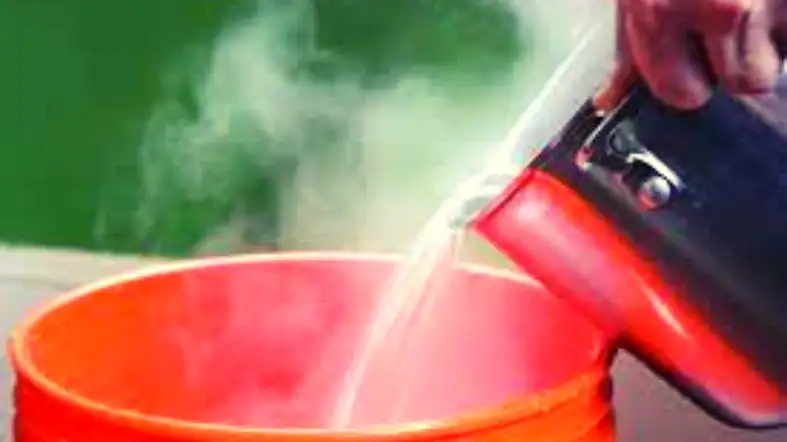
The first step is to fill a bucket with hot water. The hotter the water, the better.
2. Submerge the hitch ball in the hot water:
When the water is hot, carefully lower the hitch ball into the bucket. Let it sit for a few minutes so that the heat can penetrate the rust.
3. Use a hammer and chisel to loosen the rust:
After a few minutes, use a hammer and chisel to loosen the rust around the edges of the hitch ball.
You may need to use a little force, but be careful not to damage your trailer’s coupler.
4. Remove the hitch ball from the water:
You can remove the hitch ball from the water. Be sure to dry it off completely before moving on to the next step.
5. Attach the new hitch ball:
Now that the old hitch ball is out and the coupler is clean, you can attach the new hitch ball.
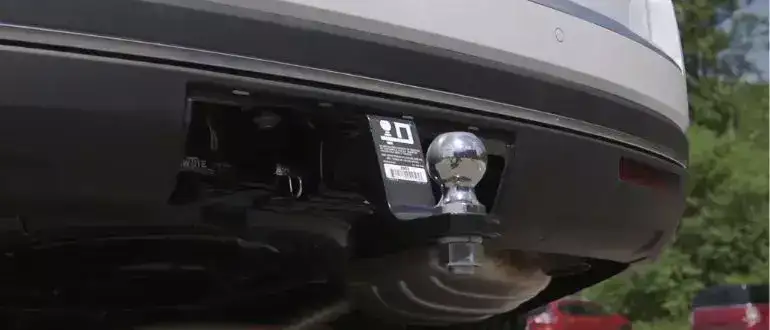
How to prevent rust on your trailer hitch ball?
1. Keep your trailer’s coupler clean and dry:
One of the best ways to prevent rust is to keep your trailer’s coupler clean and dry.
After every use, be sure to wipe down the coupler with a clean cloth.
2. Apply a rust-resistant coating:
Another way to prevent rust is to apply a rust-resistant coating to your trailer’s coupler.
This will create a barrier between the metal and the elements, and it can help to extend the life of your hitch ball.
3. Store your trailer in a dry, covered area:
When you’re not using your trailer, be sure to store it in a dry, covered area.
This will protect it from the elements and help to prevent rust formation.
4. Check Your Hitch Ball Regularly:
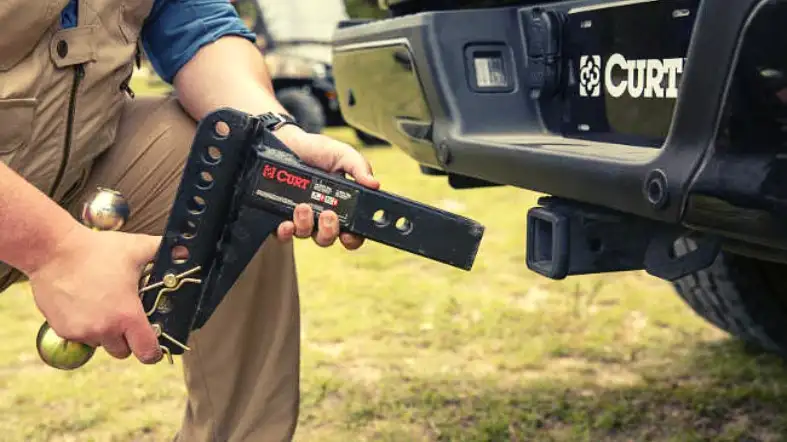
It’s also a good idea to check your hitch ball on a regular basis for signs of rust.
If you notice any corrosion, be sure to remove the rust and apply a new coat of paint or rust-resistant coating.
5. Use a hitch ball cover:
If you’re worried about rust, you can also use a hitch ball cover.
This will help to keep your hitch ball clean and dry, and it can also help to prevent corrosion.
6. Use a rust-resistant hitch ball:
There are also rust-resistant hitch balls on the market.
These hitch balls are made from materials that are resistant to corrosion, and they can help to extend the life of your trailer’s coupler.
7. Use a rust-inhibiting primer:
If you’re painting your trailer or its coupler, be sure to use a rust-inhibiting primer.
This type of primer will help to prevent rust formation, and it can also help to extend the life of your paint job.
8. Inspect your trailer regularly:
It’s also important to inspect your trailer regularly for signs of rust.
If you notice any corrosion, be sure to remove the rust and apply a new coat of paint or rust-resistant coating.
How to inspect a trailer hitch ball for rust?
Tow vehicles and trailers are subject to a lot of wear and tear. Over time, this can lead to the formation of rust on the hitch ball.
If left unchecked, rust can cause serious damage to your trailer and its coupler. That’s why it’s important to inspect your hitch ball regularly for signs of corrosion.
If you notice any rust on your hitch ball, be sure to remove it immediately. You can use a wire brush or sandpaper to remove the rust.
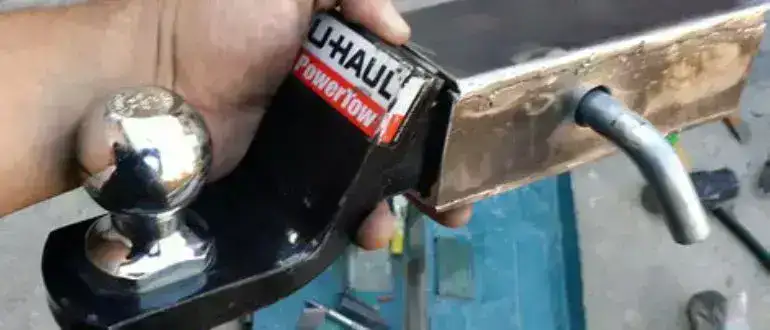
Be sure to apply a new coat of paint or rust-resistant coating.
By taking these steps, you can help to prevent further corrosion and extend the life of your trailer’s coupler.
How to use a rust-inhibiting primer when painting your trailer or its coupler?
1. Choose a rust-inhibiting primer that is compatible with the paint you will be using.
2. Follow the instructions on the primer can for mixing and applying the primer to your trailer or coupler.
3. Allow the primer to dry completely before painting over it with your chosen paint color.
4. Inspect your trailer regularly for signs of rust and reapply the primer as needed.
FAQs About Removing Rusted Hitch Ball
How Often Should I Check My Trailer’s Hitch Ball For Rust?
It’s a good idea to inspect your hitch ball on a regular basis for signs of corrosion.
If you notice any rust, be sure to remove it immediately.
What Is The Best Way To Remove Rust From A Trailer Hitch Ball?
You can use a wire brush or sandpaper to remove the rust from your hitch ball.
Once the rust is gone, be sure to apply a new coat of paint or rust-resistant coating.
How Can I Prevent Rust From Forming On My Trailer’s Hitch Ball?
There are several things you can do to prevent rust formation on your trailer’s hitch ball.
You can apply a rust-resistant coating, store your trailer in a dry place, and inspect your hitch ball regularly for signs of corrosion.
What Should I Do If I Find Rust On My Trailer’s Hitch Ball?
If you notice any rust on your hitch ball, be sure to remove it immediately.
You can use a wire brush or sandpaper to remove the rust.
Once the rust is gone, be sure to apply a new coat of paint or rust-resistant coating.
Can I Use A Hitch Ball Cover To Prevent Rust?
Yes, you can use a hitch ball cover to help prevent rust formation.
Hitch ball covers help to keep your hitch ball clean and dry, and they can also help to extend the life of your trailer’s coupler.
Is It Better To Paint Or Coat My Trailer’s Hitch Ball?
It depends on your personal preference.
You can either paint or coat your hitch ball with a rust-resistant coating.
Either way, be sure to inspect your hitch ball regularly for signs of corrosion and reapply the paint or coating as needed.
Do You Recommend Any Particular Rust-Resistant Coatings For Hitch Balls?
There are many different types of rust-resistant coatings available on the market.
Some popular options include zinc oxide, epoxy, and polyurethane.
Whatever type of coating you choose, be sure to follow the manufacturer’s instructions for application and reapplication.
How Often Should I Reapply The Rust-Resistant Coating To My Hitch Ball?
It’s a good idea to reapply the rust-resistant coating to your hitch ball on a regular basis.
Be sure to follow the manufacturer’s instructions for application and reapplication.
Conclusion
Now that you know how to remove a rusted trailer hitch ball, you can keep your trailer in good condition and extend the life of your coupler.
By following these tips, you can help to prevent rust formation and keep your trailer looking its best.
